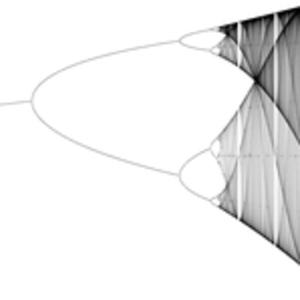Course Videos and Other Materials (zip files):
|
chaos_unit_01.zip (653 MB) |
chaos_unit_02.zip (1 GB) |
chaos_unit_03.zip (1.8 GB) |
|
chaos_unit_04.zip (762 MB) |
chaos_unit_05.zip (537 MB) |
chaos_unit_06.zip (778 MB) |
|
chaos_unit_07.zip (1 GB) |
chaos_unit_08.zip (819 MB) |
chaos_unit_09.zip (631 MB) |
Additional Reading
non-technical: these are books in the "popular science" style.
- Gleick, James. Chaos: Making a new science. Random House, 1997. Very readable, focuses on the scientists and mathematicians behind many of the key results in chaos. amazon.com
- Stewart, Ian. Does God play dice?: The new mathematics of chaos. Penguin UK, 1997. More mathematical detail and richness than Gleick's book. Also quite readable. amazon.com
-
Mitchell, Melanie. Complexity: a guided tour. Oxford University Press, 2009. A general book about complex systems. amazon.com
history and philosophy of science: these books and articles are mostly non-technical, but are scholarly pieces on the history and philosophy of science.
- In the Wake of Chaos: Unpredictable Order in Dynamical Systems. Stephen H. Kellert. University of Chicago Press. 1994. amazon.com
-
Smith, Peter. Explaining chaos. Cambridge University Press, 1998. More technical than Kellert. amazon.com
-
Aubin, David, and Amy Dahan Dalmedico. "Writing the History of Dynamical Systems and Chaos: Longue Durée and Revolution, Disciplines and Cultures." Historia Mathematica 29.3 (2002): 273-339. A long paper thoroughly examining some of the strands of thoughts that converged to form the field of chaos and dynamical systems. pdf
-
Bishop, Robert, "Chaos", The Stanford Encyclopedia of Philosophy (Fall 2009 Edition), Edward N. Zalta (ed.) html
-
Hoefer, Carl, "Causal Determinism", The Stanford Encyclopedia of Philosophy (Spring 2010 Edition), Edward N. Zalta (ed.) html
textbooks with more mathematical details: i've listed these textbooks in approximate order from introductory to advanced.
-
Feldman, David P. Chaos and Fractals: An Elementary Introduction. Oxford University Press, 2012. At roughly the same level as this class. amazon.com
-
Flake, Gary William. The Computational Beauty of Nature: Computer Explorations of Fractals, Chaos, Complex Systems, and Adaptations. The MIT Press, 1998. In a few places uses calculus. A very clear and engaging introduction to chaos, fractals, and complex systems more generally. amazon.com
-
Kaplan, Daniel, and Leon Glass. Understanding Nonlinear Dynamics. Springer-Verlag, 1995. A basic introduction to dynamical systems. Uses calculus but does not assume prior coursework in differential equations. amazon.com
-
Strogatz, Steven. Nonlinear dynamics and chaos: with applications to physics, biology, chemistry and engineering. Westview Press, 2001. Highly recommended. amazon.com
-
Peitgen, Heinz-Otto, Hartmut Jürgens, and Dietmar Saupe. Chaos and fractals: new frontiers of science. Springer, 2004. amazon.com
-
Smale, Stephen, Morris W. Hirsch, and Robert L. Devaney. Differential equations, dynamical systems, and an introduction to chaos. (3rd edition.) Academic Press. 2012. amazon.com
-
Devaney, Robert L. An Introduction to Chaotic Dynamical Systems. (2nd edition.) Westview Press, 2003. amazon.com
-
Ott, Edward. Chaos in Dynamical Systems. (2nd edition.) Cambridge University Press, 2002. amazon.com
lectures and documentaries
- Raymond Flood. Butterflies, Chaos and Fractals. Museum of London. 17 September 2013. link
- Nic Stacey and Jim Al-Khalili. The Secret Life of Chaos. BBC 4. January 2010. dailymotion.com vimeo.com (with arabic(?) subtitles)
